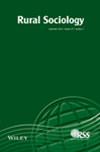Searching for Higher Ground: Watershed Migration and Cultural Curation in the Fallout of Disaster*
IF 1.9
3区 社会学
Q2 SOCIOLOGY
引用次数: 0
Abstract
Due to land loss from sea level rise, subsidence, and hurricanes, coastal Louisiana residents face decisions about whether and how to move to live more securely. These (seemingly) biophysical processes are compounded by sociocultural evolution and technological progress, which often make rural people and communities feel devalued. Using these observations as a background, we ask: how do disaster‐related migration strategies correspond to broader migration trends nationally and globally? And, how do local, place‐based cultures influence and permeate these migration decisions and strategies? We rely on 32 interviews with those who are from southeastern Louisiana and are connected to local seafood industries. Using the Intracoastal Canal as a line of risk demarcation, respondents were recruited as either stayers (those residing south of the canal) or migrants (those who moved north of the canal or elsewhere). We find that within both groups, many individuals and/or their family members participate in watershed migration and cultural curation, practices of moving up the bayou toward safer ground and bringing place‐based practices along with this movement. We conclude by highlighting how the non‐linear experiences of migrants are part of larger historical narratives and practices of change, migration, and cultural and physical survival.寻找高地:灾难余波中的分水岭迁移与文化策展*
由于海平面上升、地表沉降和飓风造成的土地流失,路易斯安那州沿海居民面临着是否搬迁以及如何搬迁才能生活得更安全的抉择。这些(看似)生物物理过程与社会文化演变和技术进步相辅相成,往往使农村居民和社区感到被贬低。以这些观察为背景,我们不禁要问:与灾害相关的移民策略如何与国家和全球范围内更广泛的移民趋势相对应?当地的地方文化又是如何影响和渗透这些移民决策和策略的?我们对来自路易斯安那州东南部并与当地海鲜产业相关的 32 位人士进行了访谈。以沿海内运河为风险分界线,受访者被招募为留守者(居住在运河以南的居民)或迁移者(迁移到运河以北或其他地方的居民)。我们发现,在这两个群体中,许多人和/或其家庭成员都参与了流域迁移和文化整理,即沿着河口向更安全的地方迁移,并在迁移的同时将以地方为基础的习俗带入其中。最后,我们强调了移民的非线性经历如何成为更大的历史叙事以及变革、迁移、文化和物质生存实践的一部分。
本文章由计算机程序翻译,如有差异,请以英文原文为准。
求助全文
约1分钟内获得全文
求助全文
来源期刊

RURAL SOCIOLOGY
SOCIOLOGY-
CiteScore
4.60
自引率
13.00%
发文量
47
期刊介绍:
A forum for cutting-edge research, Rural Sociology explores sociological and interdisciplinary approaches to emerging social issues and new approaches to recurring social issues affecting rural people and places. The journal is particularly interested in advancing sociological theory and welcomes the use of a wide range of social science methodologies. Manuscripts that use a sociological perspective to address the effects of local and global systems on rural people and places, rural community revitalization, rural demographic changes, rural poverty, natural resource allocations, the environment, food and agricultural systems, and related topics from all regions of the world are welcome. Rural Sociology also accepts papers that significantly advance the measurement of key sociological concepts or provide well-documented critical analysis of one or more theories as these measures and analyses are related to rural sociology.
 求助内容:
求助内容: 应助结果提醒方式:
应助结果提醒方式:


